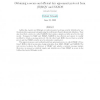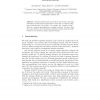50 search results - page 6 / 10 » A New Two-Party Identity-Based Authenticated Key Agreement |
90
Voted
SCN
2010
Springer
14 years 11 months ago
2010
Springer
In this work, we consider Authentication and Key Agreement (AKA), a popular client-server Key Exchange (KE) protocol, commonly used in wireless standards (e.g., UMTS), and widely c...
100
Voted
DCC
2008
IEEE
16 years 20 days ago
2008
IEEE
LaMacchia, Lauter and Mityagin recently presented a strong security definition for authenticated key agreement strengthening the well-known Canetti-Krawczyk definition. They also ...
108
Voted
JUCS
2008
15 years 1 months ago
2008
Unknown Key-Share (UKS) resilience is a basic security attribute in authenticated key agreement protocols, whereby two entities A and B should not be able to be coerced into shari...
171
Voted
TCOS
2010
14 years 7 months ago
2010
Password Authenticated Key Exchange (PAKE) is one of the important topics in cryptography. It aims to address a practical security problem: how to establish secure communication be...
106
click to vote
EUROCRYPT
2001
Springer
15 years 5 months ago
2001
Springer
Message integrity from one sender to one receiver is typically achieved by having the two parties share a secret key to compute a Message Authentication Code (MAC). We consider the...


